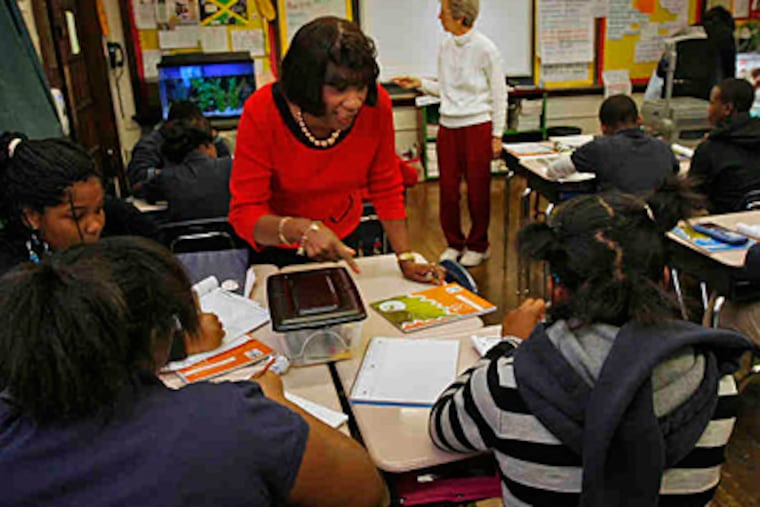Stu Bykofsky: Lots to learn from Spring Garden School
AT HER LAST school, math teacher Judith Grant received extra compensation from the Philadelphia School District. At her current school, Grant, 39, gets no financial bonus, but she enjoys a better benefit - being able to teach and help shape her students' futures.

AT HER LAST school, math teacher Judith Grant received extra compensation from the Philadelphia School District.
At her current school, Grant, 39, gets no financial bonus, but she enjoys a better benefit - being able to teach and help shape her students' futures.
In the boxy, orange-brick Spring Garden School, at 12th & Melon, Grant is in a minority because she's been there only five years. The word around the district is that once teachers land at the K-8 school, they never want to leave.
Like super-veteran Joanne Fidler, who has logged 35 years at Spring Garden. She could retire if she wanted to, but she doesn't.
"It's a community here, and we refer to ourselves as the Spring Garden family," says Fidler, a sparrowlike math teacher. "There's always someone you can go to to talk to - there's someone who will work with you, there's someone you can count on."
The school has 310 students and 42 staffers, half of whom have served more than 10 years, and the "continuity of having a lot of veteran teachers makes a tremendous difference," says principal Laureal Robinson, who's in her first year at Spring Garden. Nearly all her students are poor, and her school serves kids from two homeless shelters.
Despite that, according to school-district numbers, Spring Garden is 10 points above the district average for reading and math and outperforms other schools with similar student populations.
To explore the reasons for Spring Garden's success, I am in the small gym talking with Grant, Fidler, reading teacher Eloise Overby, 57, and health and phys-ed teacher Laurie Kristiniak, 55. A veteran teacher, the elegant Overby transferred to Spring Garden six years ago. The plain-talking Kristiniak has been here 34 years.
Many veterans with decades of Spring Garden service have retired in recent years. They are gone, but not forgotten.
Actually, they're not even gone.
"We have one who's in a long-term [substitute-teacher] position; we have another who's here per diem," says Fidler. "They won't sub anywhere else."
Kristiniak chimes in that other retirees come in to volunteer when a call goes out for help.
Help comes from outsiders, too.
"Volunteers come in to help as tutors," says Grant. "Retired business people, doctors, lawyers."
The nearby Congregation Rodeph Shalom started volunteering 14 years ago, and other parts of what Overby calls "our faith-based community" have stepped forward.
"They love it here," interjects Fidler.
"The synagogue donated holiday gift bags so every single child had a gift, and now others are doing it, too," says Grant.
The school is an oasis of calm and learning in an urban spider web that entraps other schools and demoralizes teachers. Spring Garden teachers say their success is formed by a triangle: students, parents, teachers.
If students need after-school help to catch up, or to move ahead, teachers are there for them.
Grant leaves her Southwest Philly home at 6:40 a.m., leaves Spring Garden at 5:15 p.m. Fidler usually drives her to the subway. Remember them the next time you hear about lazy, overpaid, indifferent teachers.
Principal Robinson says her teachers "have a high commitment level to the school and extremely high expectations for students."
It's true.
As Kristiniak takes me on a tour of the clean, orderly building, I notice the numbers "82" pasted on walls.
The school's testing in the mid-60s now, but the goal is 82. Not the final goal - the next goal.
The principal knows it, the teachers know it, even the kids know it.
"We make display boards," says Overby. "They are aware of where they are and where they need to be and what they have to do to get there."
The parents know, too, and most are helpful. In inner-city schools, that's not always true.
Grant ticks off some of the students' problems - homelessness, abuse, addicted parents, broken homes.
"If it means playing mother," Overby says, she does it. "By any means necessary, you will learn."
Kristiniak adds: "We are oftentimes many of our children's stability." She is now teaching students who are the children of earlier students.
"They want their kids at Spring Garden," she says of the parents. "They will fight to be here."
The teachers make it sound as if Spring Garden, not Disneyland, is the happiest place on earth.
But there are problems.
Grant would like a building more "technologically advanced," Kristiniak pines for a gym big enough for full-court basketball, Overby decries the lack of a chemistry lab, and Fidler says, "Every student should have a laptop."
Kristiniak sums it up: "It's a great school not because we don't have issues. It's a great school because we all work hard at it, every day."
They all do it every day, and some have done it for decades.
E-mail stubyko@phillynews.com or call 215-854-5977. For recent columns: